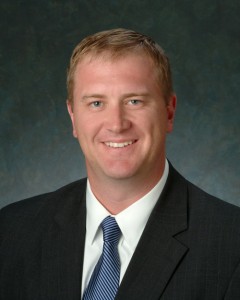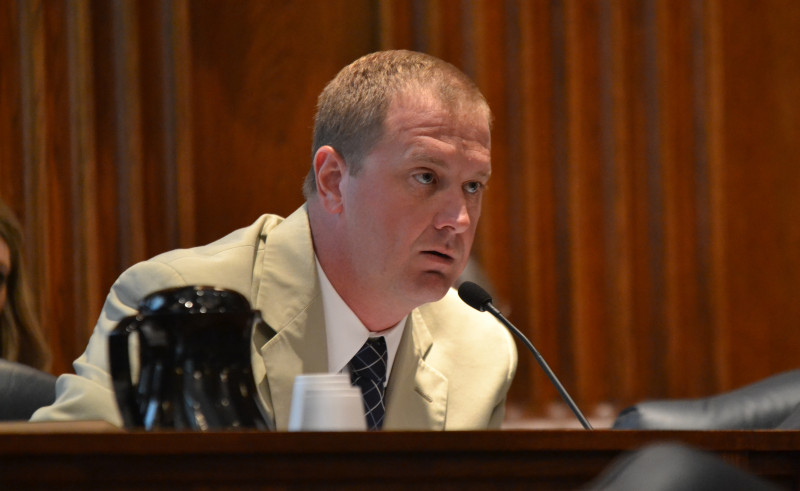JEFFERSON CITY, Mo. – When SB 572 passed last week, it marked the completion of what some see as significant civil rights legislation in response to the unrest in Ferguson two years ago, joining last year’s SB 5.
The bill, sponsored by Sen. Eric Schmitt, R-Glendale, addresses municipalities using non-moving violation citations to generate revenue. SB 5 addressed moving violations.
SB 572 went through a long process towards final passage. It had several hearings where leaders from cities would testify against the bill, including at a rare hearing of the Select Committee on Judiciary. But it also brought together a broad and diverse coalition of supporters, leading to overwhelming passage in both chambers of the General Assembly.
“We had African American clergy, tea party activists, Missouri Alliance for Freedom, the ACLU and law enforcement, all supporting what we were trying to do,” Schmitt said in a conversation with the Missouri Times about the bill. “You don’t get that type of representation across the political spectrum unless you are on the right track. I think we are. And I think it’s going to provide people the opportunity to look at the government structure in Missouri and beyond and have a chance to ask some questions that have been avoided for a long time.”

For Schmitt, both pieces of legislation were a response to the unrest in Ferguson, near where he grew up. He wanted to learn why the people there were so distrustful of their government and he found ways that he hopes will help solve the problem.
“I spent some time listening to people, which I think is a pretty understated leadership quality these days, trying to gather from law enforcement, people, African American clergy, what are some of the challenges that we should address,” he said. “And what everyone kept coming back to was that there had been this breakdown of trust between people and their government and people and their courts.”
He learned that a lot of the small municipalities in St. Louis County had been using citations as a way to generate revenue, which caused a lot of the distrust in the system. As a conservative, Schmitt felt like this greatly overstepped the bounds of government.
“When you see long lines, at midnight, wrapping around pawn shops, it really shocks the conscience,” he said. “We saw that there were some cities in St. Louis County in particular that were getting 40, 50, 60 percent of their revenue from traffic tickets and fines. There were examples that were undeniably extreme and abusive.”
Some of the examples Schmitt found included cities dramatically increasing ticketing over the course of a year, towns having arrest and citation quotas, and one city, Edmonston, where the mayor wrote a letter to the police chief to remind him that the officers’ salaries were paid for by revenue generated from tickets.
Schmitt offered SB 5 last year and SB 572 this year to help address the problems.
“People were literally being thrown into debtor’s’ prisons for their inability to pay a fine for a tail light being out. This thing had gotten way out of hand,” he said. “Last year, we instituted reforms within the municipal courts to make sure people weren’t going to jail for these minor infractions. These are not criminals, these are minor infractions.”
This year’s legislation moved on from traffic tickets to non-moving violations that included walking on the wrong side of a crosswalk, having a grill in the front yard and having mismatched blinds and drapes.
“We wanted to be mindful of, on this road to reform, some cities were looking for exit ramps. And what we found were that some cities like Kingsdale for example, literally had bureaucrats roaming neighborhoods looking for mismatched blinds and drapes to cite people. We had somebody come into the hearing on 572 this year who had to budget monthly for the harassment she would get from her city while she’s working two jobs and trying to send her kids to college.”
But the process to getting the reforms passed hasn’t been without its struggles. Several of the municipalities have opposed the legislation and made their opposition known in hearings.
“[The opposition] really was limited to people who were profiting, if anything, from an unjust system. I get it. I don’t agree with it, but I think some of these cities are just used to getting that revenue,” Schmitt said. “And some of them don’t care how they get it. It’s just a mentality of government is entitled to it, and I don’t subscribe to that. I believe government does not exist for it’s own purposes, but to serve the people.
“The great irony is that some of the city leaders who have fought against this so hard with taxpayer money, whether it’s lobbyists or filing lawsuits, those are all taxpayer dollars, are some of the people who are abusing their citizens the most.”
One of those lawsuits Schmitt referenced has resulted in SB 5 being overturned in a lower court, with a future date in the Missouri Supreme Court. But Schmitt isn’t worried about the constitutionality of SB5 or SB 572.
“I think that ultimately, the Missouri Supreme Court will rule in our favor. I don’t believe the court will want to be a part of rolling the clock back on a fundamental issue, and I would even argue a civil rights issue. I’m very confident that the Supreme Court will rule in our favor. And then I think the reforms in SB 572 will only bolster those reforms and are constitutional,” he said.
“We took into account with SB 5 and SB 572, the idea that some city that wanted to keep money and not turn it over to the county school fund would maybe file a lawsuit. We were ready for that, Rep. Cornejo and I drafted this to make sure that it fit within the four corners of the law.”
As Schmitt runs for state treasurer, he thinks the legislation he’s passed gives him credibility in a statewide role.
“With the role of the treasurer, I think you can always help remind people what the role of government is. There’s an opportunity to help shed some light on cities that are doing it well,” he said. “I intend to try to be a watchdog on behalf of citizens to make sure that they are not being used as ATMs. It’s wrong and to have somebody at the statewide level that has sponsored these kinds of reforms and really united a broad constituency, I think that would have credibility to continue to work on these issues and be helpful where I can and point out places that are doing it well and some places that aren’t.”
No matter how the election turns out though, Schmitt’s accomplished something that he sees as a big part of his legacy in the state.
“I think it’s a legacy kind of effort, not just for me, but for a lot of people who worked on this who really believe that we can do better. This system had been allowed to kind of feed itself. This beast had been able to prey upon the least among us and the poor and people who could least afford it. I believe we’ve righted some wrongs that have been exacted over the last several years.”







